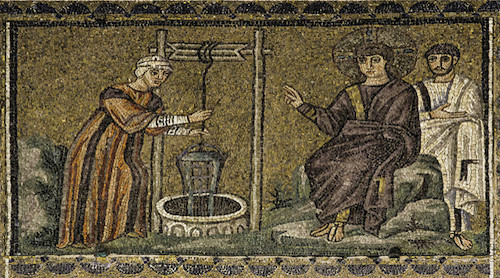We run our website the way we wished the whole internet worked: we provide high quality original content with no ads. We are funded solely by your direct support. Please consider supporting this project.

Jesus and the “Favored Nation”
Nationalism lies at the heart of the Old Testament narrative. This concept is intimately wrapped up with the law-oriented covenant God made with the Israelites at Mount Sinai, for at the heart of this covenant is the promise that obedience would bring national security while disobedience would bring national disaster (Deut. 27-28). What we shall now see is that the nation-centered portrait of God in the OT is also a mask that our humble, incarnational God condescended to wear. This correlates with the Principle of Cruciform Accommodation that I introduce in Crucifixion of the Warrior God.
To grasp the nature of this concept, we first need to appreciate how intense Jewish nationalism had become around the time of Christ. Jews had been oppressively ruled by pagan nations for centuries and was at this time lorded over by the Romans. The longing to see Israel restored to the “glory days” of King David was at a fever pitch. Many believed this restoration would happen when an anointed descendent of David would lead Israel in a violent uprising to overthrow their pagan oppressors. This was not only a yearning for political autonomy; it was, much more importantly, a yearning for theodicy. The fact that God’s chosen nation was being ruled by pagans in their own Promised Land was for many an assault on the distinctive Jewish claim that Yahweh was the one true God and the Lord of all the earth.
When Jesus demonstrated a power and authority beyond anything anyone had seen before, many Jews began to suspect he was the long-awaited Messiah. Yet, he remained frustratingly silent about national and political matters. People continually tried to entice Jesus to weigh in on political issues, but he never took the bait. Even worse, some of Jesus’ teachings directly challenged the assumption that Israel was a divinely favored nation.
One example of this teaching is found in his inaugural sermon in his hometown synagogue. Jesus stood and read from Isaiah 61. This passage declares that God’s anointed servant would proclaim good news to the poor, give freedom for prisoners, provide sight to the blind, set the oppressed free, and proclaim the year of the Lord’s favor. Jesus then stunned his audience by announcing that this messianic prophecy was being fulfilled in him (Lk. 4:18-19).
Even more shocking, however, was the fact that Jesus ended his reading without reading the final clause of the Isaiah passage. For many Jews of this period, this was an important part of the Good News that the messiah was supposed to bring, for this clause added that the servant of the Lord would proclaim “the day of vengeance for our God” (Isa 61:2b). Many were convinced that God’s favor toward Israel would be proven most decisively when he poured out his wrath on their national enemies and restored Israel to its former greatness. By leaving this clause out, Jesus was implying that the Good News of God’s favor was for everyone, including Israel’s oppressors.
Adding insult to injury, Jesus went on to remind his audience of the story of Elijah feeding and healing the son of the pagan widow in Sidon (vs. 25-26) and the remarkable story of Elijah healing the leprous military captain of the Syrian army, which occurred at a time when Israel and Syria were at war with each other (vs. 27). What’s most significant about these stories is that they are examples of prophets bypassing Jews to minister to outsiders and enemies. By recounting these stories, Jesus was suggesting that, not only was he not going to proclaim vengeance on Israel’s enemies, and not only was the Good News intended for everyone, but those who were confident they were God’s special people by virtue of their nationality and adherence to the law would frequently find themselves passed by.
Jesus was, in essence, turning the concept of a divinely favored nation on its head. Not only was it invalid; he was suggesting this nationalistic assumption actually constituted a major obstacle to people receiving the Good News! Many of Jesus’ teaching reflect this same theme, for they speak of confident insiders who find themselves on the outside while those who are typically viewed as outsiders find themselves inside. Jesus’ hometown audience clearly got the point, for they became so enraged they wanted to kill him (vs. 28-29).
Photo credit: Lawrence OP via Visual hunt / CC BY-NC-ND
Category: General
Tags: Israel, Jesus, Kingdom of God, Nationalism
Topics: Enemy-Loving Non-Violence
Related Reading

What do you think of the “Penal Substitution” view of the atonement?
If asked what Jesus came to do and how he did it, most contemporary western Christians would automatically say something like, “Jesus took the punishment from God that I deserved.” This is what’s usually called “Penal Substitution” view of the atonement, for it emphasizes that Jesus was punished by God in our place. His sacrifice…

Xmas
Kevin Dooley via Compfight Zach Hunt brings a huge challenge in this article about the ongoing lament about the “liberal attack on Christmas.” Maybe the real problem is not with the media or the “liberals” or the merchants, but with us. There’s an opportunity here for us to remember who we really are and what…

The Jesus Story is a Myth!…And History
Image by Len dela Cruz The Jesus story has a curious, and fascinating, relationship with myth and legend. The story of God coming to earth, being born of a virgin, manifesting a heroic, counter-cultural love toward outcasts, dying for the people who crucified him and then rising from the dead has a familiar “echo” to it.…

Are You Anti-American?
Greg answers the frequently asked question of whether he is anti-American. What’s your best guess? Watch the video and find out!

Quotes to Chew on: How First Century Jews Came to Worship a Man
“Legends do not generally arise in contradiction to fundamental convictions held by the culture of those who create and embrace them. Yet if the Jesus story is largely a fictitious legend, this is exactly what we must suppose happened. We submit that the initial historical implausibility of this supposition should be enough for us seriously…

Podcast: Why Did Jesus Need to Be Baptized?
Greg submerges himself in the topic of Jesus’ baptism. http://traffic.libsyn.com/askgregboyd/Episode_0078.mp3
